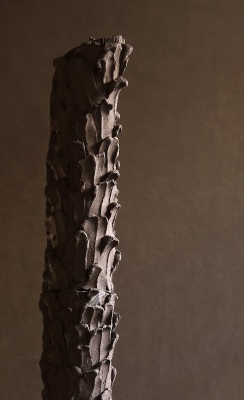Descripción de la Exposición
Just like the different forms of oppression and discrimination are usually linked to one another and happen simultaneously, environmental destruction cannot be perceived autonomously, but rather manifesting in close connexion with the cultural and historical processes that shaped our present. The current ecological emergency is not isolated from the expansion of merchant economy —and the establishment of a logic of colonialist exploitation— or contemporary forms of commercial imperialism. The gears that dig out and destroy the resources are the same that exploit the life and death of human beings. The very same who decide that certain natural elements are precious and deserve preservation, while others can be sacrificed to nourish an hypertrophied consumer society whose foundations are laid as well upon symbolic hierarchies.
This exhibition is a polyphonic project intended to showcase diverse possibilities to rethink a future inside a world under threat. Rather than conforming into a straightforward system of thought or a series of univocal answers, it offers —through a manifold selection of artworks and artists— a form of entangled “tentacular thinking”, allowing to create connexions and narratives that are not linear or predetermined. The title of the show remains itself a question. One will find echoes of one particular piece in the practice of a different artist, thus establishing and nourishing dialogues and exchanges. A sense of ecological consciousness can nevertheless be traced throughout the show and manifest in the choice of materials, techniques and practices.
Lara Almarcegui calculates, using geological data, the weight and rock composition of the island of Ibiza, in an attempt to raise questions about the rights and property of those resources. Her practice has always been connected to the socioeconomic and geological status of the land, whether it is public or private, and has literally explored it beneath the surface. With an installation that includes over forty paintings, Christian Vinck creates a cartography of the mining regions of Venezuela, based on satellite views of the country. The destruction of large areas of rainforest in order to extract valuable mining resources —which already rises important questions and contradictions— is paired with the routes of the Venezuelan gold, creating a link with historic colonial trade. In a similar way, Rossella Biscotti investigates the colonial commercial routes to South Asia, as well as the early scientific botanical expeditions that brought to Europe specimens of exotic plants. One in particular, the Rafflesia Arnoldii, has centered her attention because of its oddity and symbolic appeal. The flower, an official State emblem of Indonesia, is shown dissected for scientific purpose: “dismembered”, as if it was a dead body.
The sense of this new interconnected “ecological order” is also present in Edgardo Aragón’s cartography of the world. The playful panda stands as a symbol of Chinese diplomatic efforts to soften the international image of the nation and its policies. The map, however, notes the list of countries that have already accepted 5G technology, while it remains banned from others. In Landscape 1-9, Hajra Waheed deploys a panoramic view, from the heights of a vantage point, over a desert field. Across the ground stretches a lengthy, undetermined, structure —could be a wall, a pipeline maybe— opening to hypothetic interpretations about the state of the territory and the nature of the elements that appear on it.
Bianca Bondi combines the chemical properties of salt to preserve and crystallise with the symbolic qualities that different cultures and historic periods have associated with it. She creates allegorical environments, encapsulated inside transparent showcases, which —like an ecosystem— have a life of their own. In a series of paintings featuring dramatic sunsets, Nohemí Pérez explores the tradition of sublime romantic landscape, but the overwhelming experience of contemplating nature is replaced with the consciousness of violence, conflict and displacement. The show will be completed with works by Théo Mercier and Samuel Richardot wich also inquire on the simbolic aspects of the natural realm, by the means of an abstract oriented geometrical language.

Exposición. 17 abr de 2025 - 03 sep de 2025 / Centro Cultural Andratx (CCA) / Andratx, Baleares, España

Formación. 08 may de 2025 - 17 may de 2025 / Museo Nacional Centro de Arte Reina Sofía (MNCARS) / Madrid, España